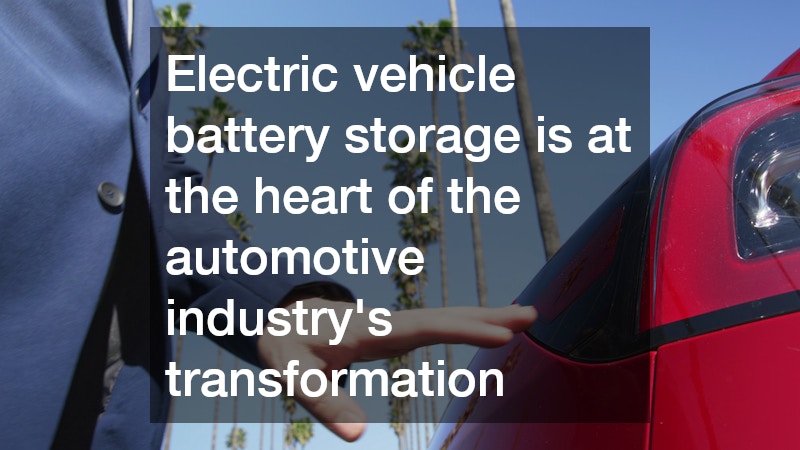The automotive industry is undergoing one of its most significant transformations in decades, driven primarily by the rise of electric vehicles (EVs). Central to this revolution is the technology behind electric vehicle battery storage, which has evolved dramatically to meet the demands of performance, safety, and sustainability. As battery technologies improve, they are not only redefining how vehicles are powered but also shaping the future of transportation and energy management. This blog explores how electric vehicle battery storage is revolutionizing the auto industry and what this means for manufacturers, consumers, and the environment.
The Evolution of Battery Technology in Electric Vehicles
In the early days of electric vehicles, battery technology was one of the most significant limitations. Early batteries were bulky, heavy, and had limited capacity, which restricted the driving range and performance of EVs.
Over the years, advances in lithium-ion battery chemistry have dramatically improved energy density, charge times, and durability. Today’s electric vehicle battery storage solutions offer much greater range and reliability, enabling EVs to compete head-to-head with traditional gasoline-powered cars.
Manufacturers have invested heavily in research and development to optimize battery packs, improving their efficiency while reducing costs. These improvements have made electric vehicles more affordable and appealing to a broader audience. Innovations such as solid-state batteries and improved cooling systems are on the horizon, promising even greater leaps forward in capacity and safety.
Enhancing Vehicle Performance and User Experience
Electric vehicle battery storage is crucial in delivering high performance and a superior driving experience. Modern battery packs are designed to provide quick acceleration, smooth power delivery, and longer driving ranges. These improvements have helped alleviate “range anxiety,” one of the biggest concerns among potential EV buyers.
Battery management systems (BMS) play a vital role in maintaining battery health by monitoring temperature, voltage, and charge cycles. This technology helps extend the battery’s lifespan and ensures consistent performance. Additionally, fast-charging capabilities have become increasingly common, allowing drivers to recharge their vehicles quickly and conveniently, further enhancing usability.
The integration of regenerative braking systems also contributes to energy efficiency by capturing kinetic energy and feeding it back into the battery storage. Together, these technologies make electric vehicles more efficient, reliable, and enjoyable to drive, accelerating their adoption worldwide.
Driving Sustainability and Environmental Benefits
One of the most profound impacts of electric vehicle battery storage lies in its contribution to sustainability. EVs produce zero tailpipe emissions, which significantly reduces air pollution and greenhouse gas emissions compared to internal combustion engine vehicles. However, the sustainability of EVs also depends on the battery storage systems and the materials used in their production.
Manufacturers are increasingly focusing on sourcing ethical and sustainable materials for batteries, such as cobalt-free or recycled components. Moreover, efforts to develop second-life battery applications are gaining traction. Used EV batteries can be repurposed for energy storage in homes or grid applications, extending their usefulness and reducing waste.
Recycling programs are also evolving to recover valuable metals from spent batteries, minimizing the environmental footprint of battery production. These initiatives reflect a broader commitment within the auto industry to build a circular economy around electric vehicle battery storage, making EVs not only cleaner on the road but more sustainable overall.
Transforming the Automotive Supply Chain
The rise of electric vehicle battery storage is reshaping automotive supply chains globally. Battery manufacturing requires raw materials such as lithium, nickel, and cobalt, creating new supply chain dynamics and geopolitical considerations. As demand for EVs grows, securing reliable sources of these materials has become a strategic priority for automakers.
In response, many companies are investing in mining operations, refining capacities, and battery production facilities. Partnerships between automotive manufacturers and battery producers have become common to ensure supply stability and foster innovation. Additionally, governments are supporting domestic battery production to reduce reliance on imports and promote local economies.
This transformation of the supply chain also involves advancements in logistics, quality control, and sustainability practices. Efficient battery production and management have become key competitive advantages for automakers as they race to meet ambitious electrification targets.
The Role of Battery Storage in Future Mobility Solutions
Electric vehicle battery storage is not only transforming personal transportation but is also a cornerstone for future mobility solutions. Autonomous vehicles, shared mobility services, and smart cities will rely heavily on advanced battery technologies to deliver safe, efficient, and sustainable transportation options.
Furthermore, electric vehicle battery storage integrates with energy grids through vehicle-to-grid (V2G) technology, enabling EVs to act as mobile energy storage units. This capability allows vehicles to feed electricity back to the grid during peak demand, supporting renewable energy integration and grid stability.
As battery technologies continue to advance, they will open new possibilities for vehicle design, charging infrastructure, and energy management systems, creating a more connected and sustainable transportation ecosystem.
Electric vehicle battery storage is at the heart of the automotive industry’s transformation, driving innovation across performance, sustainability, and supply chain management. The advancements in battery technology have made EVs more accessible and practical, encouraging widespread adoption and reducing the environmental impact of transportation.
As automakers and technology providers continue to invest in battery research and production, the future of mobility promises to be cleaner, smarter, and more efficient. Electric vehicle battery storage will remain a critical component in this journey, powering the shift towards a sustainable and electrified automotive landscape.




